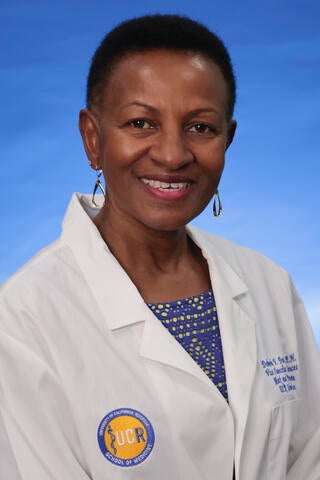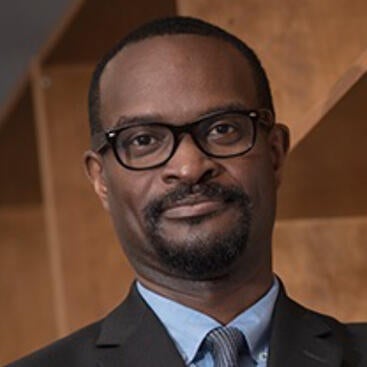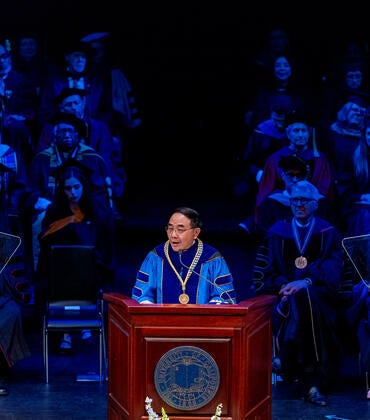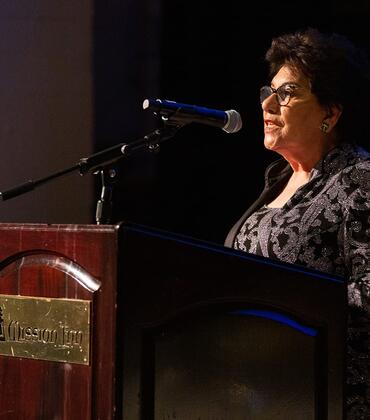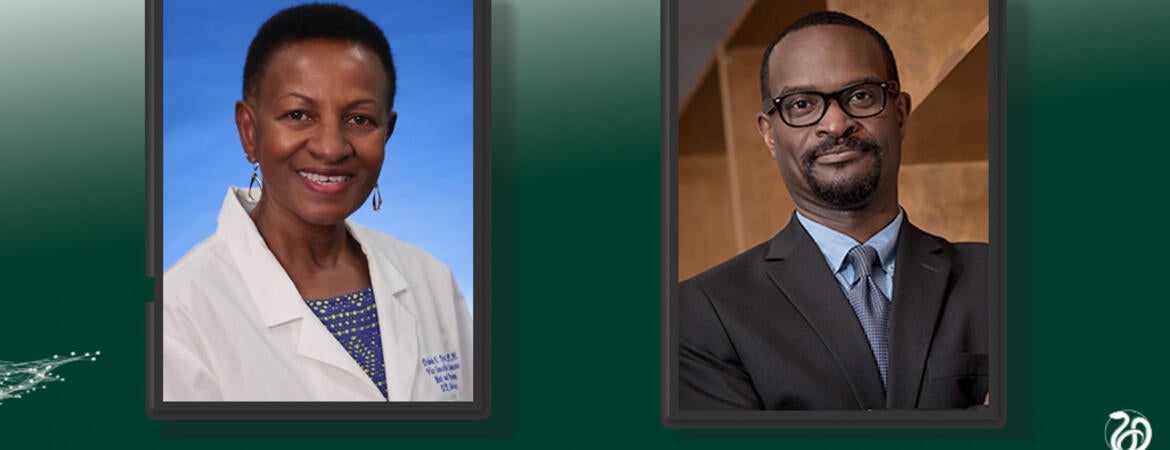
The School of Medicine at the University of California, Riverside, has two reasons to celebrate today.
Dr. Deborah Deas, vice chancellor of health sciences and the Mark and Pam Rubin Dean of the UCR School of Medicine, and Mario Sims, a professor in the medical school’s Department of Social Medicine, Population and Public Health, have been elected members of the National Academy of Medicine, or NAM. Membership in the academy is one of the highest national honors in health and medicine.
Established in 1970 as the Institute of Medicine, NAM is an independent organization of eminent professionals from diverse fields including health and medicine; the natural, social, and behavioral sciences; and beyond. Along with the National Academy of Sciences and the National Academy of Engineering, NAM serves as an adviser to the nation and the international community.
NAM membership recognizes individuals who have demonstrated major contributions to the advancement of the medical sciences, health care, and public health. All members volunteer time to serve on committees examining a broad range of health policy issues.
Deas, M.D., M.P.H., is recognized for contributing to the extant literature, generating millions in grant funding on adolescents with substance use disorders, and being a national contributor to addressing health disparities through diversifying the physician workforce, especially around the shortage of
Black males in medicine.
Sims, Ph.D., M.S., FAHA, is recognized for his pioneering work documenting that perceived racial discrimination predicted both higher baseline prevalence of hypertension in African American individuals and a higher incidence 8-10 years later.
“The election of two UCR School of Medicine faculty to the National Academy of Medicine in the same year is a testament to the strength of our faculty and research program,” Chancellor Kim A. Wilcox said. “Both Dean Deas and Dr. Sims have contributed knowledge to public health issues of chemical dependency and health disparities — work that advances health science while also contributing to broader community needs.”
Deas earned her M.D. from the Medical University of South Carolina’s College of Medicine. She is a leading researcher of adolescent substance abuse treatment, anxiety disorders, and depression and was a pioneer in the development of assessments and treatments specifically designed for adolescent substance users. She has served in a leadership role nationally on several initiatives in medical education, student affairs, faculty affairs, diversity and inclusion, and women in medicine. With many years of experience in medical administration, she is a standard-bearer for diversity, equity, and inclusion and has devoted most of her career to addressing healthcare workforce diversity.
Under her leadership at both the Medical University of South Carolina, where Deas served as senior associate dean for medical education, and at the UCR School of Medicine, the number of underrepresented students, residents, faculty, and staff in medicine increased significantly. The UCR School of Medicine, which Deas joined as dean in 2016, recently ranked sixth nationally for diversity according to the U.S. News and World Report; it has 45% underrepresented medical students and 42% underrepresented graduate students in biomedical sciences.
Deas is the recipient of numerous awards and honors, including the Woman of Action Award, California State Legislature, 2020; National Hispanic Health Foundation Leadership in Medicine
Award, 2019; Giving Back Award, Insight into Diversity Magazine, 2017; Women in Medicine Award, Charleston Links, Inc. 2016; Achievement in Diversity Award, Student National Medical Association 2015; and Physician Mentor Award, American Medical Association, 2012.
Sims earned his doctoral degree in medical sociology/demography at the University of Wisconsin, Madison. He then completed postdoctoral training in social epidemiology at the University of Michigan at Ann Arbor and in preventive medicine and epidemiology at the University of Mississippi Medical Center. His current research focuses on understanding the social and psychosocial determinants of cardiovascular disease, or CVD, disparities, with a specific interest in examining the extent to which racism, stress, segregation, and psychosocial factors influence CVD disparities. In addition to work focused on cardiovascular disease among African Americans, he has published important work on heart disease and stroke among American Indians and Alaska Natives and Latinx populations.
Before joining UCR in August 2022, Sims was a professor of medicine at the University of Mississippi Medical Center and chief science officer of the Jackson Heart Study, or JHS. He was also interim director and principal investigator of JHS, sponsored by the National Institutes of Health, or NIH.
His awards and honors include the Excellence in Research Award, Gold Level, University of Mississippi Medical Center, 2015; Fellow of the American Heart Association, Epidemiology and Prevention Council, 2013; Excellence in Research Award, Silver Level, University of Mississippi Medical Center, 2007; and Ford Foundation Postdoctoral Research Fellowship, Ford Foundation and National Institute of Mental Health, 1997-1999.
Sims has been the principal investigator or co-investigator of NIH funding related to the social determinants of health and resilience and CVD among African American adults. He has published more than 215 research papers in peer-reviewed journals and given over 200 professional presentations at scientific conferences, symposia, and grand rounds. Currently, he is a member of the Society for Epidemiologic Research and the American Heart Association (Council on Epidemiology and Prevention & Council on Hypertension). His professional service at the national level includes being a member of the National Institutes of Health National Advisory Council on Minority Health and Health Disparities as well as of the American Heart Association, LIFESTYLE Obesity Committee of the Council on Lifestyle and Cardiometabolic Health.
At UCR, Deas and Sims join Bruce G. Link, a distinguished professor of public policy and sociology, and Dr. Michael V. Drake, a distinguished professor of internal medicine, as NAM members. Deas and Sims are two of 90 regular members and 10 international members elected by NAM today during its annual meeting. The newly elected members bring NAM’s total membership to more than 2,200, including the 190 international members.
“This extraordinary class of new members is comprised of exceptional scholars and leaders who have been at the forefront of responding to serious public health challenges, combatting social inequities, and achieving innovative discoveries,” said National Academy of Medicine President Victor J. Dzau. “Their expertise will be vital to informing the future of health and medicine for the benefit of us all.”
